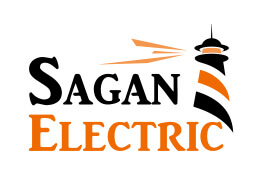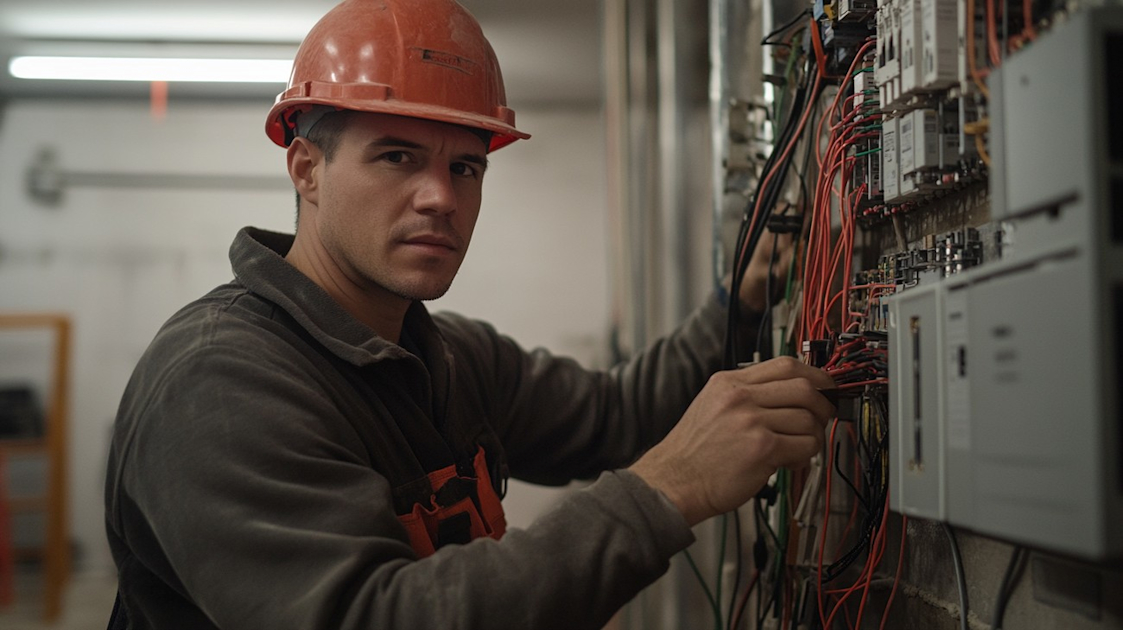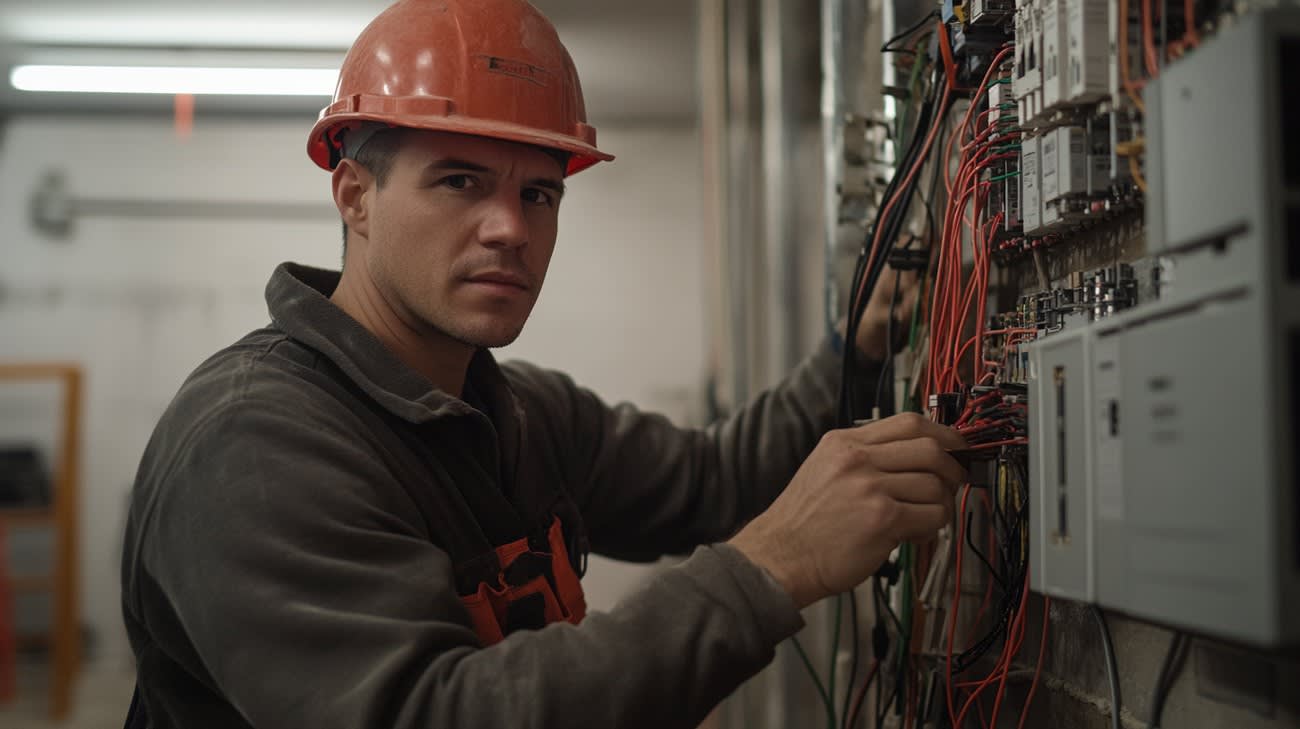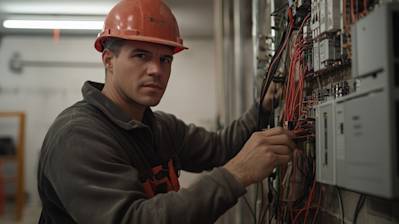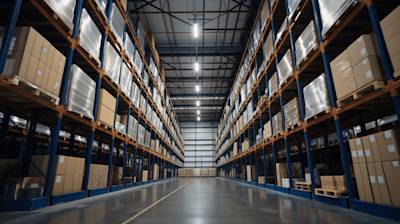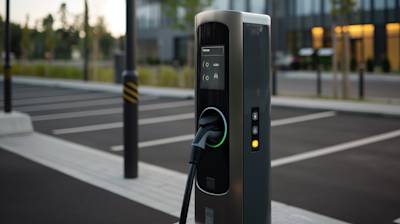The modern commercial landscape heavily relies on electrical power. From lighting to HVAC systems, from computers to security gadgets, electricity is the engine driving the commercial world. Employees working in commercial entities enjoy a comfortable workplace setting, and patrons who visit the entities are catered for by the diverse amenities they use their services, all thanks to electricity.
The significant role electricity plays in the commercial sector cannot be overstated, and maintaining the electrical functionality in these entities is crucial. This is where commercial electricians come in.
In this comprehensive guide, we will delve into the world of commercial electricians, their roles, importance, and training, among other things.
Understanding Commercial Electrician Role
A commercial electrician specializes in setting up and maintaining the electrical devices in commercial buildings, including offices and stores. Unlike residential electricians, commercial electricians practice in more extensive environments requiring more intricate electrical configurations.
Typically, their daily tasks revolve around:
- Reading blueprints
- Installing and maintaining electrical components
- Inspecting electrical equipment
- Troubleshooting electrical issues
- Adhering to electrical safety regulations
Commercial electricians master the art of dealing with both single-phase and three-phase power supplies and a variety of wire systems and conduits.
Importance of Commercial Electricians
Commercial electricians bear primary responsibility for the safety and functionality of a commercial entity's electrical system. They ensure that electrical installations follow the correct standards, thereby offering some essential benefits such as:
- Ensuring Safety - Electrical mishaps can lead to severe accidents or damage. Commercial electricians ensure safety by diagnosing and correcting electrical faults.
- Enhancing Efficiency - Regular maintenance by a commercial electrician can reduce the risk of unexpected outages, improving efficiency and uptime.
- Compliance - Commercial electricians ensure companies comply with local and national electrical codes, avoiding penalties or shutdowns.
What Makes a Great Commercial Electrician?
There are key characteristics and skills that a reputable and dependable commercial electrician should possess:
- Licenses and Certifications - A credible commercial electrician should have the necessary licenses and certifications from relevant authorities. Certification gives evidence that the electrician has undergone and excelled in the necessary training to perform the job.
- Experience - Commercial electrical work isn't for novices. The experience is vital in understanding complex electrical systems and offering solutions unique to different commercial settings.
- Insurance - An insured commercial electrician gives you peace of mind that you're covered in case of any mishaps during the job.
- Communication Skills - A professional commercial electrician must effectively communicate with other team members and clients.
The Training of Commercial Electricians
Commercial electricians require specialized training due to the complex nature of the job. Most commercial electricians start their training as apprentices, which entails:
- Completion of a GED or high school diploma
- Enrollment in an electrician apprenticeship program
- Completion of the apprenticeship program, usually that takes 4-5 years
- Passing a licensing exam
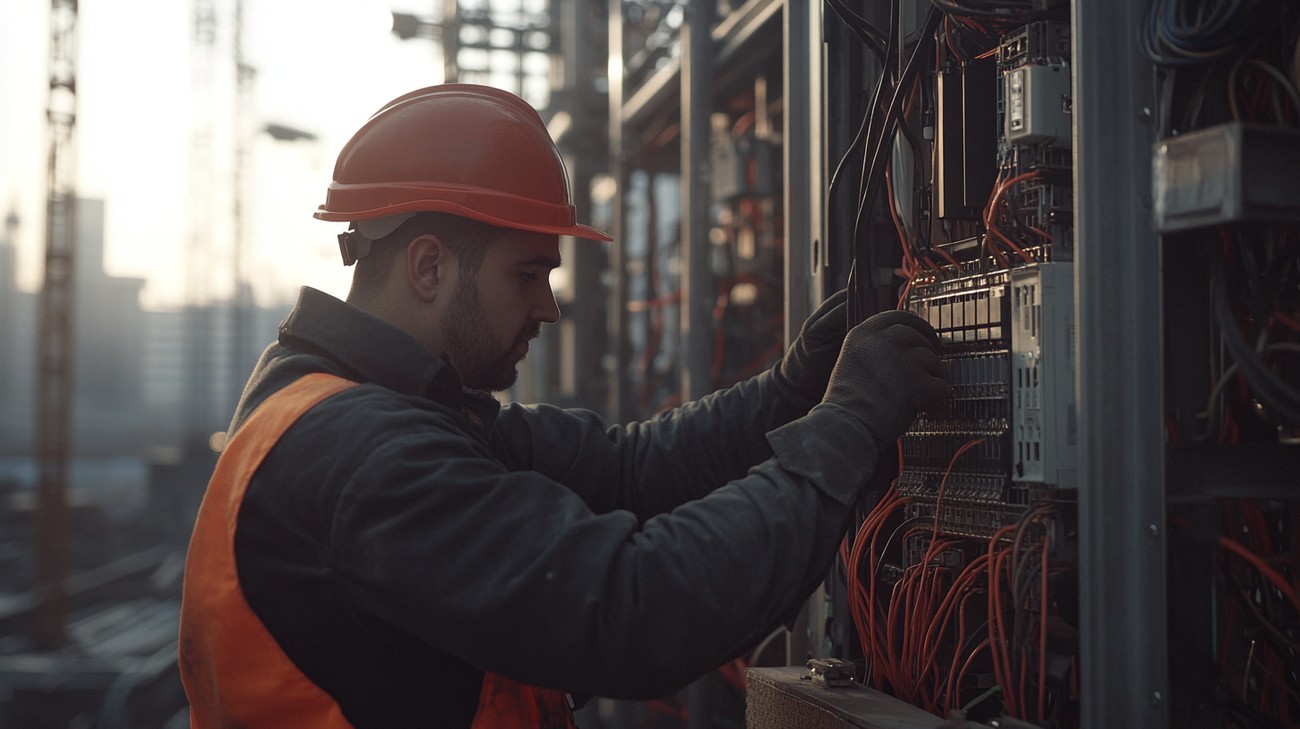
Frequently Asked Questions about Commercial Electrician
What Qualifications Should a Commercial Electrician Have?
Typically, a commercial electrician should have completed relevant electrical training and possess a valid license from a recognized authority. They also need to have proper certification to prove their competence in handling commercial electrical works. Good communication skills and problem-solving abilities are also essential, given the complexity of commercial electrical systems.
What Is the Difference Between a Residential and Commercial Electrician?
While both residential and commercial electricians work with electrical systems, the key difference lies in the work environment and the complexity of tasks. Residential electricians typically work in homes and small apartments, dealing with relatively less complex systems. Commercial electricians, on the other hand, handle more intricate electrical systems in commercial establishments, often dealing with high-voltage systems and large-scale projects.
How Do I Hire a Commercial Electrician?
You can hire commercial electricians by searching online for reputable companies, asking for recommendations, or going through online review sites. Consider factors like experience, reviews, licensing, and the range of services being offered before making a choice.
What Factors Determine the Cost of Hiring a Commercial Electrician?
Several factors contribute to the costs of hiring a commercial electrician. This includes the complexity of the job, materials required, size of the project, and the amount of time it will take to complete. The electrician's experience and expertise could also impact the cost. Always get a detailed estimate before proceeding with any work.
How Do Commercial Electricians Ensure Safety?
Commercial electricians abide by stringent safety regulations and standards to ensure safety at the work site. They are trained to work safely with electrical systems and use equipment and techniques that minimize risks. Moreover, they conduct routine inspections and maintenance to keep electrical installations running optimally and safely.
What Types of Commercial Establishments Do Commercial Electricians Serve?
Commercial electricians serve a wide array of commercial establishments that can range from small businesses to large corporations. This includes retail stores, office buildings, hotels, schools, restaurants, healthcare facilities, factories, and more. They cater to the specific electrical needs of each establishment, addressing their unique challenges.
Why is Regular Maintenance Important in Commercial Establishments?
Regular maintenance by commercial electricians is essential in commercial establishments to ensure that all electrical systems function efficiently, and any risks of electrical faults are minimized. Regular inspections can also help to identify potential problems early on, saving significant costs in repairs or replacements later. Furthermore, maintenance helps to ensure compliance with safety standards, reducing the risk of accidents.
What is Energy Efficient Lighting in Commercial Electrical Services?
Energy-efficient lighting refers to light fixtures that consume less energy compared to traditional lighting options. Commercial electricians are experts in installing, maintaining, and advising on energy-efficient lighting solutions. These fixtures can reduce energy consumption, cut utility costs, and contribute to environmental sustainability, making them a popular choice for many businesses.

Pros of Being a Commercial Electrician
Stable Job Market
As a commercial electrician, you can expect to benefit from a stable job market. With the ever-increasing demand for electrical power in commercial buildings, the need for qualified commercial electricians will continue to rise.
Competitive Salaries
The pay rate for commercial electricians is usually higher when compared to their residential counterparts. This is mainly due to the complexity and scale of commercial electrical work, which requires more expertise and special training. Additionally, since commercial projects are typically larger and more involved, they can provide a more consistent income.
Variety of Work
Commercial electrical work is often more varied than residential work, which can make the job more exciting and less monotonous. You could be working on a variety of tasks, from installing lighting systems in a store to troubleshooting an electrical fault in a restaurant or office building.
Opportunity for Career Advancement
The commercial electrician field offers plenty of opportunities for professional development and career progression. With experience, commercial electricians can become project managers, electrical inspectors, and even start their own electrical contracting businesses.
Working Hours
Commercial electricians often work regular business hours, giving them a more stable work schedule compared to other trades. Although occasional weekend or evening work may be required, most commercial electricians enjoy a consistent Monday to Friday work schedule.
Cons of Being a Commercial Electrician
Physically Demanding
Being a commercial electrician can be physically demanding, as it requires manual dexterity, physical stamina, and the ability to work in a variety of conditions. Electricians may have to climb ladders, work in tight spaces, and handle heavy equipment or tools.
Safety Risks
Working with electricity can be hazardous. Despite thorough training and safety measures, there is still a risk of injury from electrics, especially when working with high voltage systems. Electric shock, burns, and falls from ladders are common risks in this profession.
Continuous Training
Due to the evolving nature of technology and electrical standards, continuous learning is a must for commercial electricians. This could mean investing both time and money on further training and education to stay up-to-date with the latest advancements and safety regulations.
Stressful Work
The job can sometimes be stressful, especially when dealing with complex electrical systems or safety issues. Timelines and deadlines in commercial projects can also add an extra layer of stress as delays can result in significant financial penalties.
Limited Mobility
As a commercial electrician, you may primarily work in urban environments where commercial buildings are located. This could limit your ability to move or live in rural areas or locations that don't have a concentration of commercial facilities.

Myths and Misconceptions About Commercial Electricians
Commercial electricians play a vital role in ensuring the daily operations of businesses from all sectors. However, numerous misconceptions about their job still circulate among the public. This section aims to debunk those myths and set the record straight on what being a commercial electrician really entails.
Myth 1: All Electricians Do the Same Work
Misconception: Residential, Commercial, and Industrial Electricians Perform the Same Tasks
This is a common misconception among many people. Although all electricians receive similar training at the start of their careers, the scopes and complexities of their jobs differ greatly.
Reality: Different Electricians Specialize in Different Areas
Commercial electricians focus on electrical systems in businesses, office spaces, and commercial facilities. Their work generally involves installing and maintaining large-scale wiring systems and electrical components, which often demand more complex solutions and installation processes than residential environments.
Conversely, residential electricians specialize in home electrical systems, and their work mainly involves repairing minor electrical issues, replacing electrical outlets, or rewiring homes. Industrial electricians, on the other hand, handle electrical systems in manufacturing and industrial settings, which often require specialized knowledge of machinery and production equipment.
Myth 2: Anyone Can Do the Work of a Commercial Electrician
Misconception: Commercial Electrician's Work Is Simple and Can Be DIY'd
This misconception arises from the erroneous assumption that commercial electrical work only involves replacing light bulbs or fixing broken switches.
Reality: Commercial Electrician's Work Is Complex and Requires Professional Expertise
Commercial electricians deal with large-scale and often complex tasks that require extensive knowledge and experience. They undergo rigorous training and get licensed to handle intricate wiring systems and electrical installations that guarantee the safety of an entire commercial facility. Performing DIY commercial electrical work can not only lead to severe damages and safety hazards but can also violate building codes and regulations.
Myth 3: Commercial Electricians Only Work in Construction Sites
Misconception: The Work of a Commercial Electrician Is Limited to Construction Projects
Many associate commercial electricians with construction projects, imagining their job only involves installing electrical systems in new buildings.
Reality: The Work of a Commercial Electrician Extend Beyond Construction Sites
Besides installing electrical systems in new buildings, commercial electricians also perform maintenance and upgrade services in existing facilities. They diagnose and fix electrical faults, improve energy efficiency, install new systems, and ensure the overall safety of the electrical operations within an establishment.
Myth 4: Commercial Electricians Are Always On Call
Misconception: Commercial Electricians Are Required to Be Available 24/7
Often, people assume that commercial electricians, like other emergency service providers, must be always on standby.
Reality: Commercial Electrician's Working Hours Vary
While some commercial electricians might offer emergency services, many work standard business hours. Their schedule often depends on the needs of their clients and the specific projects they are working on.
Myth 5: Commercial Electrical Work Is Not Dangerous
Misconception: The Job of a Commercial Electrician Is Without Risks
Some people believe that commercial electricians face less danger than their counterparts in residential or industrial settings.
Reality: Commercial Electricians Face Significant Risks
Commercial electricians often work in high-risk environments involving high-voltage systems, heavy machinery, and construction sites. This places them at risk for electrical shocks, burns, falls, and other injuries.
To conclude, understanding commercial electricians' specialized and vital roles will give businesses a greater appreciation of their importance. Knowledge helps dispel misconceptions, and it reminds us of the complexity and intricacy involved in powering our everyday life.
Summary
So, that wraps up our discussion about commercial electricians. Whether it's a small firm or a multinational corporation, every business needs a commercial electrician to keep their electrical systems functioning efficiently. These professionals not only handle routine maintenance but also emergency repair works. They're typically equipped with the knowledge of state and local building codes and safety regulations to ensure a completely safe work environment.
Commercial electricians are undoubtedly an indispensable part of any commercial establishment. They play a critical role in setting up and maintaining heavy-duty electrical systems, commercial-grade appliances, and advanced connectivity solutions. The expertise and skill set of a commercial electrician can make a huge difference in the smooth functioning of any commercial enterprise.
We hope this gives you a better understanding of the role and importance of a commercial electrician. If you run a business, no matter the scale, investing in a good commercial electrician is a wise decision. Not only does it help in preventing electrical mishaps, but it also keeps your business operations running smoothly, leading to productivity and ultimately, profits. They provide comprehensive electrical services to keep your business in check, from lighting to power distribution and system upgrades.
About Sagan Electric
At Sagan Electric, we're more than just an electrical services company in beautiful Sacramento, CA. For us, it's all about lighting up your world with seamless, top-notch electrical solutions that perfectly suit your needs. Our expert team, equipped with years of experience, is passionate about getting your lights on, keeping your business humming, and ensuring your home is safely and efficiently powered. We care about our community and consider you much more than a client - you're our neighbor. So, whether you're faced with an unexpected blackout or keen on giving your spaces a lighting makeover, just remember, at Sagan Electric, you're always in skilled and caring hands.
Tags: electrician, commercial, professional,
